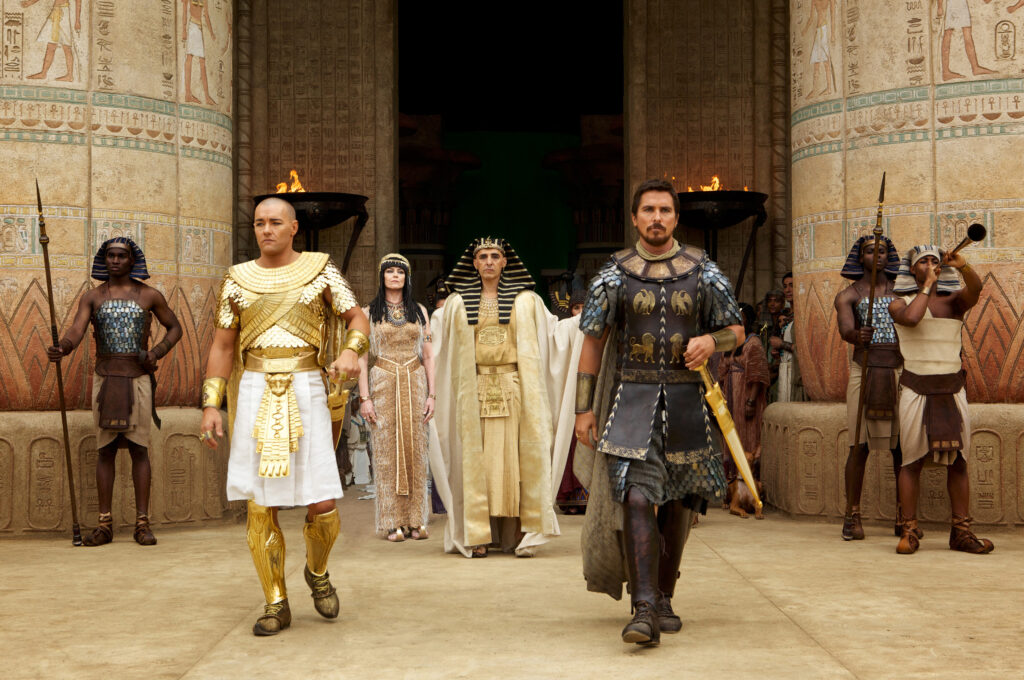The recent controversy over the casting of predominantly white actors in Middle Eastern roles in Exodus: Gods and Kings is, it turns out, the least of the film’s problems. Not even Ridley Scott’s prodigious skills as a visual stylist are enough to prevent Exodus: Gods and Kings from being a rather turgid, timidly modern take on the famous Biblical tale of Moses helping slaves escape Egypt from the clutches of his pharaoh brother Ramses. For those who don’t know the story by now (and/or haven’t seen Cecil B. DeMille’s two versions of The Ten Commandments): Ramses (Joel Edgerton) and his adopted brother Moses (Christian Bale) were raised as siblings, but after Pharaoh Seti (John Turturro) dies and Ramses ascends to the throne, it’s revealed that Moses was born a Hebrew. In exile, he’s plagued by what are either miraculously divine visions or the hallucinations of a madman. Either way, Moses becomes convinced that God wants him to free his people from bondage by any means necessary, and thus returns to wage war on his former brother’s oppressive regime.
The foundations of that drama are inexplicably elided, more often assumed as common knowledge than actually depicted. Ostensibly brothers torn apart by ideological conflict and open rebellion, Ramses and Moses barely share a handful of scenes together before Moses is run out of the pharaoh’s temple, and even those scenes emphasize only Moses’ sensible calm and Ramses’s petty jealousy. Because there’s never a sense of a filial bond, there is no reason to lament the eventual dissolution of their relationship. The hellish treatment of the Hebrew slaves by the Egyptians also ends up being more discussed than illustrated. This isn’t to suggest that the idea of slavery isn’t inherently awful enough, but in Exodus: Gods and Kings, it comes off more as merely the exploitation of a minority workforce rather than the inhumane forced servitude it truly is. It isn’t until late in the film, once Moses’s guerrilla war has begun in earnest, that we’re informed of Egyptian atrocities like summary executions and people worked to death.
a narrative that’s both historically reductive and a spectacle that’s insufficiently awe-inspiring
Scott’s view of the miraculous is also strangely hobbled. Moses’s encounters with God are reduced to banal philosophical debates between Bale and — that’s right, a young Caucasian boy. There’s at least some sad (commerce-dictated) logic behind Scott’s casting white actors in Middle Eastern roles — but God as a generic white kid? That’s a surprisingly stale depiction of the divine coming after more powerful films like The Last Temptation of Christ or The Passion of the Christ, to name just two pictures that took a similar approach to imagining the Supreme Being onscreen. Lamer still, once the truly, Biblically weird stuff begins to occur, Scott seems all too eager to insinuate some rational reasoning for it all. Exodus’s most exciting moments are the legendary ten plagues: rivers of blood, pestilence, a deluge of frogs. But why stage the Wrath of God only to write it off as a series of natural catastrophes? If there’s one thing the Bible doesn’t need, it’s an Agent Scully-esque, Occam’s Razor, simplest-explanation-must-be-true buzzkill.
Worse than all of this, however, is its relentless visual blandness — truly disappointing for a Ridley Scott picture. Filmed (or rather video’d) in 3D, the action is unfortunately shot and staged with the same handheld lack of clarity and rapid editing Scott has been using for historical epics since Gladiator (2001), a style that’s basically become standard issue for period epics. Scott clearly intends Exodus: Gods and Kings to be simultaneously a huge-budget, special-effects-laden, modernized take on The Ten Commandments and a pragmatic, thoughtful rumination on an incredibly complicated, still-brewing conflict between two Middle Eastern cultures. Unfortunately, with its lack of dramatic urgency and unimaginative imagery, those two intentions end up canceling each other out, leaving a narrative that’s both historically reductive and a spectacle that’s insufficiently awe-inspiring.

